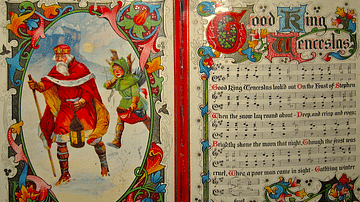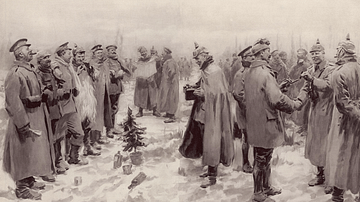In this collection of resources we look at the origins of Christmas and the story of the Nativity, the pagan traditions that have influenced how the holiday has been celebrated ever since, and how different eras have found new ways to add to the festivities from rich cakes to rousing carols.
In the Middle Ages, as now, food was a big part of the pleasure of Christmas. The rich had to outdo their already handsome manor tables, providing guests with meats like roast peacock, swan, or boar's head, as well as treats like salmon and oysters. Desserts were similar to today's festive fare: nuts, oranges, cakes, fruit custards, figs, and dates. To drink, there was sweetened or spiced wine, cider, and ale. The great Christmas meal was generally an early lunch. The table cloth was changed after every course and entertainments included music, acrobats, jesters, and plays put on by roving minstrels.









